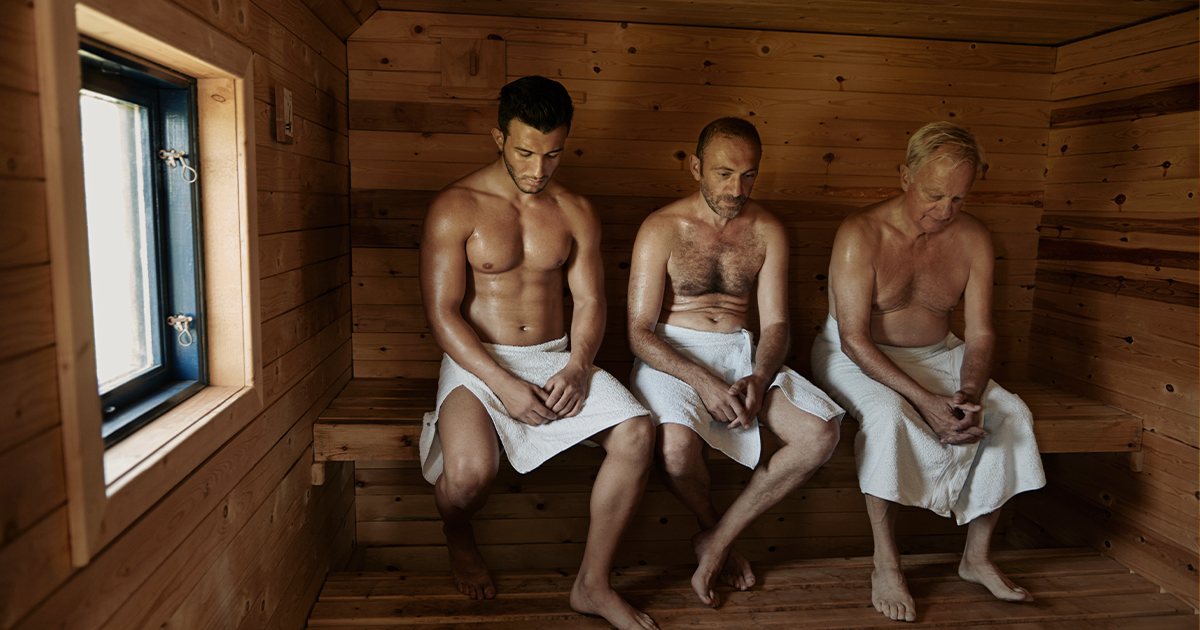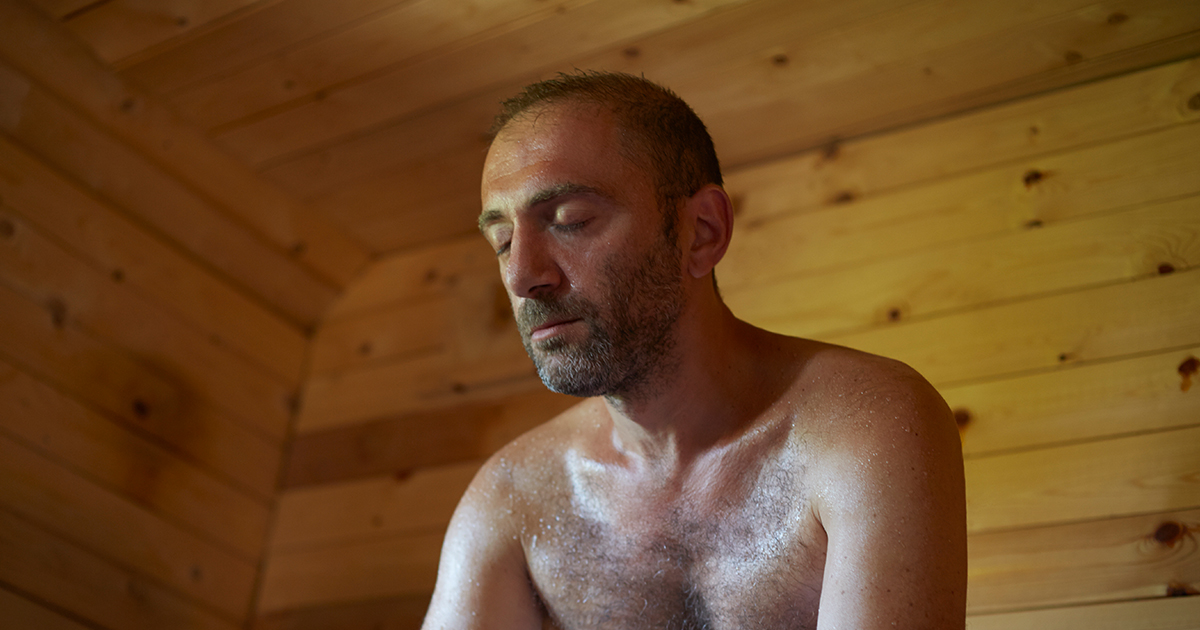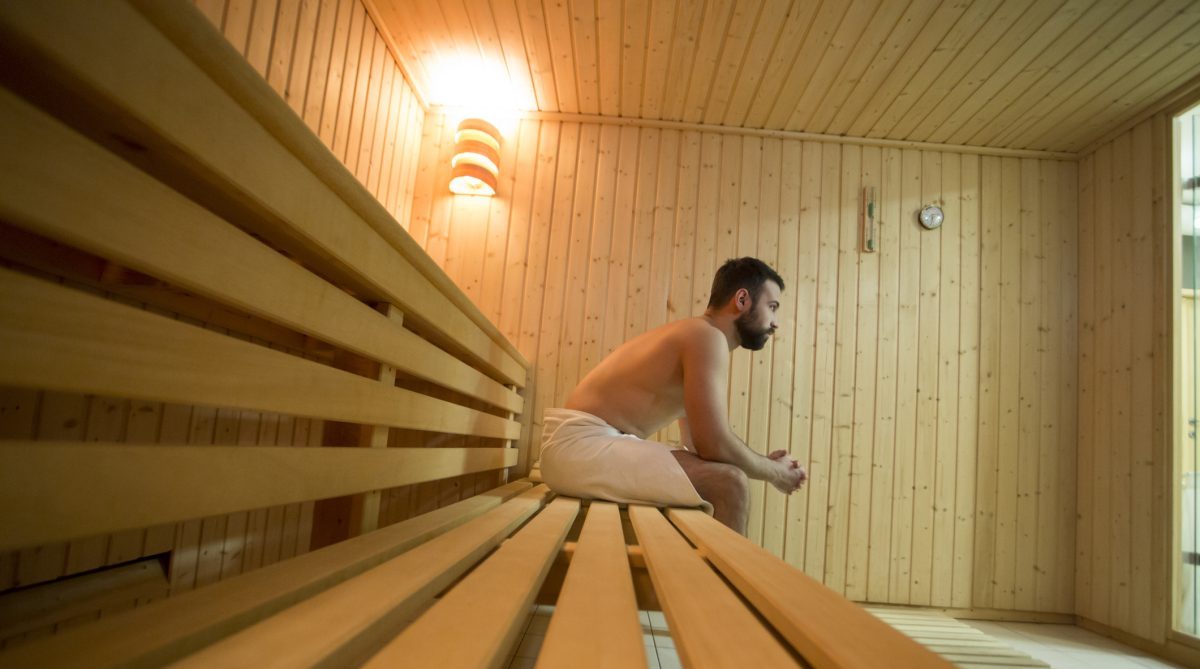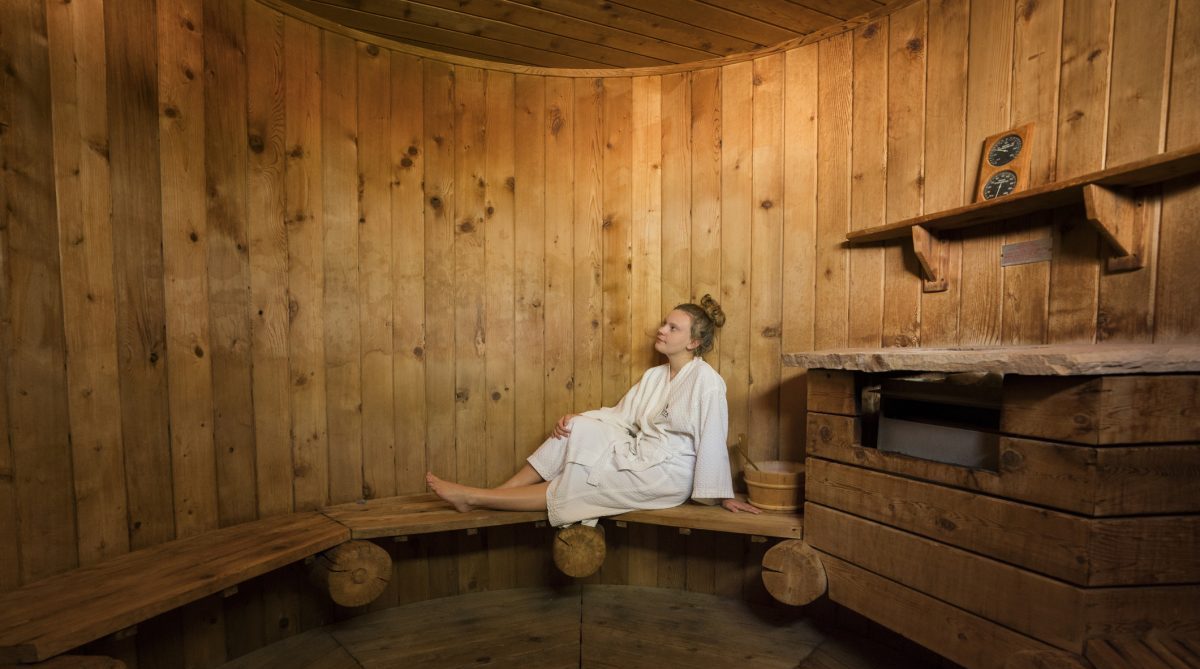Saunas are good for your heart

The heart is second only to the brain as our most vital organ, and heart disease is still the most common cause of death worldwide. We all need to take care of our hearts, and saunas can help. Studies show that regular sauna use increases your cardiovascular endurance, lowers your resting heart rate and reduces your risk of heart disease and stroke.
Your circulation will improve

The heat of a sauna increases your body temperature (up to 3.5 degree Fahrenheit), which in turn increases your heart rate and helps get the blood pumping. With continued sauna use, your blood vessels can widen, allowing your blood to circulate through your body more easily than it would otherwise.
Your blood pressure will go down

As continued sauna use typically leads to improved circulation, this in turn means that your blood pressure should go down. While for many of us this sounds like good news, it may be dangerous for people who already have low blood pressure or any other major pre-existing heart issues. If in doubt, consult your doctor before you begin using saunas.
Your stress levels will decrease

Physical relaxation is almost certainly the key thing that most people are looking for when they visit a sauna. Sitting in the warmth doesn’t just feel nice; there’s medical evidence that it helps you unwind. A 2018 study showed that sauna use can reduce our levels of the stress hormone cortisol by 10 to 40 percent.
Your skin will have a new shine

We tend to be self-conscious about sweating in public, but the sauna lets us do just that – and it’s great for our skin. The heat brings the blood vessels to the surface of our skin, clears out our pores and leaves us with a healthy-looking glow. However, people who suffer skin ailments like psoriasis or eczema may find that sauna use makes their condition worse.
Saunas help preserve muscle mass

Sauna use alone cannot serve as a substitute for physical exercise, but the health benefits are similar – so it only makes sense to combine the two. Hitting the sauna straight after a workout can be particularly beneficial, as it can help to preserve muscle mass and fight inflammation.
Stiffness in your muscles and joints will reduce

As the heat of a sauna gets the blood circulating throughout the body, this can help relieve pain in problem areas like the knees, hips, shoulders, elbows, ankles and wrists. Used regularly, saunas may provide significant relief to those afflicted by joint conditions such as arthritis.
It will remedy lower back pain

A key problem area for a great many of us is the lower back, with around four out of five people struggling with back pain at some point in their lives. By helping work out the tension in the back, neck and other related areas, saunas can help do away with such aches and pains.
Your risk of dementia and Alzheimer’s may be reduced

The increased circulation and blood flow brought on by the regular use of saunas can also have cognitive benefits. On top of reducing stress levels, studies have shown that saunas can significantly decrease our risk of developing dementia and Alzheimer’s disease (two more of the most common causes of death around the world).
Your immune system will be stronger

When we are immunised against a disease, this usually means giving us a tiny dose of the disease so our immune system generates the antibodies to fight it. In effect, this happens when we take a sauna: the heat takes us into a sort of fever state, and our immune system acts accordingly to combat this. Long term, this may protect us from infectious diseases.
Saunas help with weight loss

Sauna bathing is a great way to support weight loss, maintain a healthy weight and increase your metabolism. Infrared saunas are not a quick weight loss solution, but they can help you burn an additional 45 calories per session. Infrared sauna use also helps promote reduced stress, better sleep and detoxification, all of which can improve your metabolism.
You will detoxify your system

Infrared saunas can help your body rid itself of built-up toxins. As you sweat, the liver and kidneys take over removing this toxic waste left in your body. This leaves you feeling purified and cleansed. This process can help your body recover during sickness, hangovers or even help with quitting smoking.
Your sleep can be improved

Saunas provide a relaxing environment that can help you unwind and relax after a long, stressful day. In addition, infrared saunas may improve your sleep and reduce your blood pressure. Adding a daily sauna ritual to your self-care routine can help you destress and recenter. You can add sound therapy, chromotherapy or aromatherapy for extra touches of relaxation.
Muscle and joint pain will be relieved

Saunas are great for relieving pain and relaxing muscles. The increase in blood flow aids muscle recovery, and the heat makes your joints feel looser. Sauna use can also ease aches, pains, and arthritis symptoms by releasing endorphins, as these are your body’s natural painkillers.
It can help reduce cellulite

Infrared light therapy is a popular, non-invasive treatment for eliminating the appearance of cellulite. Saunas also help open clogged pores and remove impurities from the body while dead skin cells are shed. You can also use a sauna in conjunction with red light therapy and salt therapy to help treat skin conditions and minor wounds.
It may help with your endurance

Sauna use may lower your resting heart rate over time, which could improve cardiovascular endurance. However, the effects of sauna use on the body are different from those of traditional exercise that uses muscles. That said, you may find that sauna use is a good complement to an exercise routine.
Your skin will look better

Using a sauna can also be great for your skin, although it depends on what kind of skin you have. The heat and sweating help shed dry skin cells more easily, which is great for those with dry skin. Saunas also lead to improved circulation and collagen production, which can be especially helpful for those with sensitive or aging skin.
It can exfoliate your pores

Sweating can help clear your pores and keep your skin looking healthy, but if you have eczema or psoriasis, experts caution that using a sauna may make your skin conditions worse. If you plan to use a sauna, talk to your dermatologist first. Saunas can be moist and can be breeding grounds for bacteria and mould.
Saunas aid in exercise recovery

Saunas are a great way to relax muscles, soothe aches and pains, and release endorphins that can minimize pain. When you sit in a sauna, your body temperature rises and blood vessels dilate, allowing for increased blood circulation. The increased circulation speeds up the body’s natural healing process and helps you relax after physical activity.
It can help balance out your hormones

Keeping stress hormones in balance helps to keep other important hormones in balance, too. For example, when cortisol is kept in a healthy range, the thyroid hormone T3 and T4 are also kept in a healthy range. And because high cortisol levels can increase testosterone production, maintaining healthy cortisol levels can help prevent excess testosterone from being produced – which could be harmful if left unchecked.
Saunas can speed up wound healing

Near-infrared saunas have been shown to be effective in promoting tissue and wound healing, including retinal injury. Researchers have found that mice blinded by chemicals can recover their eyesight when exposed to near-infrared light, and Finnish and German studies show that saunas can reduce colds and flu by about 30%.
They can help you look younger

Near-infrared saunas can improve the health of your skin, making it look younger and healthier. The red light stimulates collagen and elastin production, which plump and firm your skin. Deep sweating can reduce bacteria on the skin, helping to clear up acne and improve skin health.
They may help reduce inflammation

If you want to lower your levels of chronic inflammation and feel better, try spending more time in a sauna. Scientists have found that frequent sauna use can help reduce several markers of acute and systemic inflammation, including lowering something called C-reactive protein (CRP), which is often used as a marker for inflammation.
It can improve your lung function

Studies have shown that regular sauna use during the winter can help prevent respiratory illnesses like the common cold and pneumonia. People with asthma or other chronic lung problems should talk to their doctor about how sauna use might be beneficial for them. If you’re feeling run down or think you may be getting sick, try going to a sauna.
Saunas can help with hangover recovery

Saunas can remove toxins from the body, including alcohol’s by-products. In addition, saunas can help reduce levels of lead, copper, zinc, nickel and mercury in the body. Doctors recommend detoxifying our bodies on a regular basis and using a sauna is one of the easiest ways to do this.
They can keep your hair healthy

Sauna treatments can bring out the natural shine and health of your hair. Many people recommend washing your hair with cold water afterwards to lock in the benefits for longer by closing the pores on your scalp. Sebum, the oil produced by your scalp, helps keep your hair and scalp healthy and moisturized. This can also relieve itching and other symptoms of a dry scalp.
It reduces the appearance of wrinkles

Saunas are effective at reducing the appearance of wrinkles because they increase moisture, which surrounds the skin and helps smooth out lines. Saunas have also been called “anti-wrinkle” for their effectiveness in preventing wrinkles from forming and making them look smoother and more even.
Saunas help to fade scarring

Scars can be hard to live with. There is no way to cover them or hide them, short of cosmetic surgery (and depending on the level of scarring, even this isn’t always effective). However, sauna therapy can help. It won’t make your scars disappear, but it will make them less noticeable and make your skin healthier and younger looking.
They can improve mental health

Studies have shown that regular sauna users experience improved mood, reduced depression and a reduced risk of developing psychotic disorders. Sauna use can also improve muscle circulation and brain function. This helps reduce symptoms of fatigue, giving you the energy boost that you need to maintain a positive mental state.
They may help shrink tumours

A 2002 study published in the Annals of Oncology suggested that hyperthermia — or heating a body above normal — could be a viable treatment for cancer. Researchers have found that hyperthermia can help treat cancer. When combined with radiotherapy and certain chemo drugs, it improves the success rate of treatment by 13%.
Saunas may help you live longer

It has been suggested that using a sauna might actually lengthen your lifespan, thanks to its ability to activate the “longevity gene,” FOXO3. In fact, people who regularly use saunas have been found to have a lower risk of age-related diseases like cancer and heart disease, as well as suffering fewer bone fractures and having lower levels of cholesterol.
They can improve your flexibility

Saunas help increase flexibility, which is useful for people who are physically active or in sports. The heat in saunas makes your muscles more pliable, so they’re easier to stretch and move around. This can lower the chance of injury, improve performance and make exercise feel more comfortable.
They could help treat ADHD

Norepinephrine is a hormone and neurotransmitter in the brain that helps with focus and attention. A study found that women who spent 20 minutes in a sauna twice a week saw an 86% increase in norepinephrine levels. People with ADHD often take medication to increase their norepinephrine levels, so researchers believe sauna therapy could be a good alternative treatment for those who can’t tolerate stimulants.
They improve thyroid function

Your thyroid is a butterfly-shaped gland located in your neck. It needs iodine to function properly, but it cannot tell the difference between iodine and other halogens like chlorine or bromine. However, frequent sauna use can help your body excrete halogens. The more you can excrete the halogens, the more your body will be able to use iodine to produce thyroid hormones.
They can function as a workout

Researchers in Germany compared the effects of a 25-minute sauna session to a moderate workout. They found that both activities had similar effects on heart rate, blood pressure and body temperature. In other words, a sauna session is just as tiring as exercise – but that doesn’t mean you should rely on sauna use alone to keep fit.
They reduce your risk of strokes

Sauna users may also be less likely to suffer from strokes and blood clots, according to two studies. One study showed that men and women who regularly use the sauna have a 62% lower risk of stroke than non-sauna users. Another study found that men who used the sauna had a lower risk of developing a blood clot in their veins.
It helps fight chronic fatigue

According to a study published in the journal Psychological Medicine, chronic fatigue syndrome patients who take daily infrared saunas for about four weeks report improvements in their anxiety, depression, and fatigue levels. While it’s not clear why infrared sauna therapy helps people with CFS, researchers believe it may be due to the treatment’s ability to reduce oxidative stress and improve cardiac output.
Saunas can boost metabolism

As you age, it may be harder to stay in shape. Your body produces less sweat, which leads to a buildup of toxins inside your body. These toxins can make you feel sluggish and reduce your metabolism. Sitting in an infrared sauna can help you work up a sweat and improve your metabolism.
They increase growth hormone release

Growth hormone is a hormone that promotes body repair, recovery and fat loss. One study found that growth hormone increased by 142% after a session in a sauna heated to 80-120C (176-248F). In a 1996 study, men and women who spent two hours a day in a hot sauna for one week experienced increases in growth hormone levels of up to 2.3x.
It increases red blood cell count

Sauna use also increases red blood cell count, which means greater oxygen delivery to muscles. This can lead to increased energy and better brain and physical performance. The body increases red blood cells and plasma volume when you sweat a lot in a sauna, likely because the body needs to keep red blood cell concentrations in your blood optimally balanced with plasma volume.